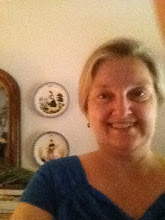 Ancient ruins and stone columns on their sides don't usually excite me, but as we walked the great wide marble streets of Ephesus together with hundreds of tourists, I got a sense of what it must have been like being home to hundreds of thousands of people. Ephesus is set between two hills. A broad marble street leads downhill past elaborate fountains and mosaic floored hill houses to a great lighted marble street (one of only 3 or 4 in the ancient world) leading grandly down to the port. As we walked we got a sense that the stuff of daily life here wasn't so different from our own and that Paul, the man who walked these streets preaching a new faith to a tough crowd (who owed their allegiance to Artemis) must have been more convincing than even the most skilled present day salesman. He did get in a bit of hot water by dissing Artemis and threatening the livelihoods of those involved in her worship, causing a riot to begin. Only the calming voice of a city official cooled the flames and foiled the lynching that surely would have proceeded had he not intervened.
Ancient ruins and stone columns on their sides don't usually excite me, but as we walked the great wide marble streets of Ephesus together with hundreds of tourists, I got a sense of what it must have been like being home to hundreds of thousands of people. Ephesus is set between two hills. A broad marble street leads downhill past elaborate fountains and mosaic floored hill houses to a great lighted marble street (one of only 3 or 4 in the ancient world) leading grandly down to the port. As we walked we got a sense that the stuff of daily life here wasn't so different from our own and that Paul, the man who walked these streets preaching a new faith to a tough crowd (who owed their allegiance to Artemis) must have been more convincing than even the most skilled present day salesman. He did get in a bit of hot water by dissing Artemis and threatening the livelihoods of those involved in her worship, causing a riot to begin. Only the calming voice of a city official cooled the flames and foiled the lynching that surely would have proceeded had he not intervened.In contrast to the narrow focused setting of Ephesus, Philippi's great open square lay in a valley where the distant hillsides surrounded it on all sides. The city seemed to ramble on and spread out forever. About 20 Km from the sea, Philippi seemed like home to normal people. Not so lucky in Philippi, Paul ended up in jail. There are various theories as to where, exactly Paul was held prisoner. Some contend he would have been in the area of the main square. I on the other hand thought he would have been held out of sight and out of mind over nearer the theater.
The remains of a large Byzantine church towered over the agora. Roofless, its shadows fell long across the stones in the encroaching evening. The characteristic terracotta and stone courses reminded me that one civilization builds on another. Craig's recollections of the site were formed long ago when far less had been excavated. I could see him reconciling his remembrance with the present and both marveling at their progress and mourning the gates and ropes, guards and admission booths that had not been there before.

Just the distances involved were impressive to me. Philippi, on the north shore of the Aegean in northern Greece was about 2 hours east of Thessaloniki or 6 or 8 hours west of Istanbul by car. Ephesus was about 6 or 8 hours south of Istanbul on the east coast of the Aegean in Turkey. Imagining the life Paul must have led traveling so far and wide selflessly proclaiming the Gospel made me read his letters in a new light. His trade - a worker with canvas and wood - seeming not so important when reading his letters without a context - seems crucial now as we imagined how he must have survived, living in and among the townspeople as a teacher and a craftsman. The real stones and structures begged the image of a real life.

No comments:
Post a Comment